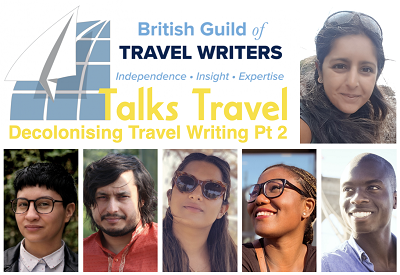In July, the BGTW hosted a discussion about decolonising travel writing which explored the stereotypes, language and images that often permeate modern travel writing and photography, and why we should be addressing this as an industry.
The next step: How to decolonise travel writing
Now we’re taking the discussion to the next level by exploring how we can improve our content. Which words and phrases are problematic, why, and what can we use instead to create better travel content and articles? How does travel photography exacerbate outdated tropes? What type of content and angles are appropriate, and how do we determine that? How else can travel content better respect and represent the places we visit? And is creating and featuring decolonised travel enough, or are there other ways that we can and should be decolonising travel culture?
Whether the content we create is a long read, a top ten listicle, a photo feature, travel marketing copy, or a radio or TV show, the language and images we use hold great sway over the way we present the destinations to readers and audiences. This honest, refreshing and lively debate will provide examples and ideas of how we can all play our part in making travel content richer, more engaging and true to the destinations we write about, and what we can do before we create our content to ensure that this happens.
Panellists
Tharik Hussain is a travel writer, author and journalist who specialises in Islamic culture and heritage. He has worked on several guidebooks for Lonely Planet, produced award-winning BBC radio about America’s first mosques and Muslim communities, and is the creator of Britain’s first Muslim heritage trails. Tharik’s work focuses on the neglected Muslim narratives in places as diverse as Lithuania, Thailand, Britain and Romania. He is currently writing his debut narrative book about a journey in search of ‘Muslim Europe’.
Ella Paradis is the founder and chief editor of The Black Explorer magazine, a new digital and print publication aiming to amplify the Black narrative in travel. She has a special interest in diversifying travel writing and travel media, having experienced the lack of diversity in the industry both as a consumer and a travel professional.
Shivani Ashoka is a travel writer and diversity advocate, based between London and New York City. She reports for Conde Nast Traveller (UK & US), The Times, The Independent, The Telegraph, Tatler and more. While currently in London, she has lived in five countries on three continents and maintains a special interest in global social impact, community-led sustainability and racial diversity. Shivani is the co-founder of fortnightly newsletter, Unpacking Media Bias, which helps journalists and marketers tackle unconscious bias in all forms of the press.
Bani Amor is a gender/queer travel writer who explores the relationships between race, place, and power, and has written frequently about decolonising travel culture. They are a four-time VONA/Voices Fellow with work in CNN Travel, Fodor’s, AFAR, and Teen Vogue, among other outlets, and in the anthology Outside the XY: Queer Black and Brown Masculinity.
Travis Levius is a freelance writer, editor, content creator and tourism consultant. After quitting his teaching job in Atlanta to pursue the unknown across the pond, he somehow stumbled upon a career that’s brought him to over 30 countries and all seven continents. His writing has appeared in Condé Nast Traveler, Travel + Leisure, CNN Travel, The Telegraph, Lonely Planet and others.
Hosted by Meera Dattani, events director, BGTW and freelance travel and culture journalist, co-editor of Adventure.com and co-founder of the Unpacking Media Bias newsletter, with a special interest in wildlife tourism, sustainable travel, post-colonial legacies, and heritage and diaspora tourism in India and East Africa. Instagram: nofixedplans

